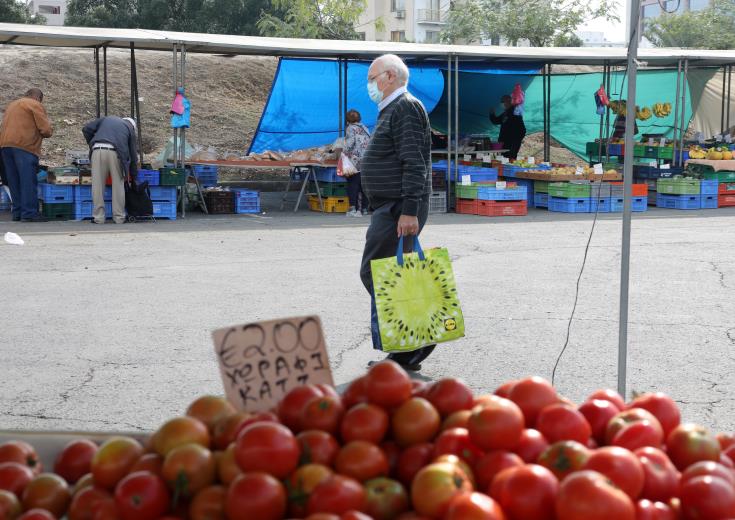Cypriot consumers have seen their purchasing power reduce by more than 5% compared to a year ago as inflation hit a 13-year record high in January.
If this wasn’t bad enough, consumers are warned that prices of essential goods will skyrocket further due to spiralling fuel costs from the crisis in Ukraine.
In comments to the Financial Mirror, the chairman of the Cyprus Consumers Association, Marios Drousiotis, said the average employee has lost between €50 to €100 in purchasing power due to fuel prices.
Fuel prices are the main culprit behind the rising inflation, with an increase of 25%, and the war in Ukraine and sanctions on Russia will compound the situation.
“Russia is one of the world’s largest oil producers, only second to the US and one of the largest natural gas exporters in the world.
“If these resources are taken off the market, then prices will increase further,” said Drousiotis.
He said it would take a few days before understanding the effects of the war in Ukraine on the energy market.
In 2020 Russia produced 10.1 million barrels per day (BPD) of crude oil and natural gas condensate. That was good for second place behind the US at 11.3 million BPD.
Russia is also the largest natural gas exporter globally, shipping an estimated 196 billion cubic meters per year.
According to data, the price for 95 octane petrol in mid-February increased by €0.327 per litre compared to the same period last year; diesel has gone up by €0.33.
“Just in 40 days, from the beginning of the year, the price of 95 octane petrol has gone up by 8 cents and diesel by 5 cents.”
He added that a one-cent increase costs some €9 mln to consumers.
“If prices stay at current levels, then consumers will pay an additional €70 mln by the end of the year”.
According to the Consumers’ Association, fresh vegetables in January increased by 18.71% from last year, other vegetables 12.16%, flour and other cereals up 10.94%, and tea rose 8.72%.
Domino effect
Dr Michalis Michael, Professor of International Trade at the University of Cyprus, said the increase in the price of metals, fuels and transportation costs are to blame.
During coronavirus, with the demand for services dropping, the demand for commodities rose.
“This meant increased pressure on producers who needed to step up production, which meant an increase in demand for raw materials and especially ores,” said Michael.
He said the spike in demand for commodities led to increasing demand for transport, transportation costs shot up due to geopolitical tensions.
The cost of bringing a container to Cyprus has gone from an average of €3,000 a few months ago to a staggering €17,000.
“Meanwhile, ports across the world found themselves not being able to cope with increased loads, with significant delays being recorded.
“Cyprus is a small economy, dependent on imports and could not be unaffected. The increase in fuel, supply of raw materials and commodities has seen inflation rise, creating a domino effect.”
The professor said construction costs have gone up, while households find it harder to stock up on essential goods as their purchasing power diminishes.
Michael said that businesses are increasing prices of their goods and services, which at some point will inevitably lead to the increase of wages, warning of a vicious cycle.
“Increasing wages will only feed into more inflationary expectations, leading to another cycle of inflation rise and then again wage rises.”
Monetary authorities, including the European Central Bank, are mulling over increasing interest rates to tighten the economy by reducing liquidity in the market.
Michael argued that limiting liquidity, in combination with an increase in demand for services such as travel with the lifting of COVID restrictions, prices of commodities should begin to stabilise.
“This will bring down demand for ores and raw materials.”
He said there isn’t much the government can do other than provide social benefits for vulnerable groups to prevent their already limited purchasing power from evaporation.
The General Secretary of the DISY-affiliated trade union SEK Andreas Matsas told Financial Mirror the government needs to protect the standard of living of Cypriots.
Many salaries are the product of collective deals struck by unions with employers.
Unions argue they would need to be fully linked to the Cost of Living Allowance to maintain their purchasing power.
Matsas argued that COLA is key to keeping inflationary trends in check, noting that unions have been fighting to restore it after being slashed following the 2013 bailout.
“We demand that COLA be restored to 100%, while the government will have to look into measures to reduce the upward trend in the prices of essential goods for the benefit of the consumer.”
He suggested the finance minister impose a ceiling on essential goods – such as bread and milk — and fuel prices until prices stabilise.










